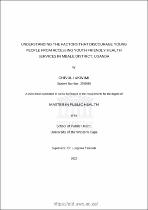| dc.description.abstract | Primary healthcare services in Uganda and sub-Saharan Africa are, for the most part, geared to the needs of adults. There are considerable gaps in delivering sexual and reproductive health (SRH) services for young people and adolescents. There are also ongoing structural barriers to the uptake of adolescent sexual and reproductive health (ASRH) services, particularly family planning, contraception, and human immunodeficiency virus (HIV) prevention, treatment, care and support. In many instances, lack of political will concerning sexual reproductive health and rights (SRHR) and human rights of girls, young women, and lesbian, gay, bisexual, and transgender (LGBT) youth means that there is a risk that the intended health and well-being outcomes for young people will not be achieved. This study aimed to explore the factors that prevent young people from accessing youth friendly health services (YFHS) in the Mbale district of Uganda. | en_US |

